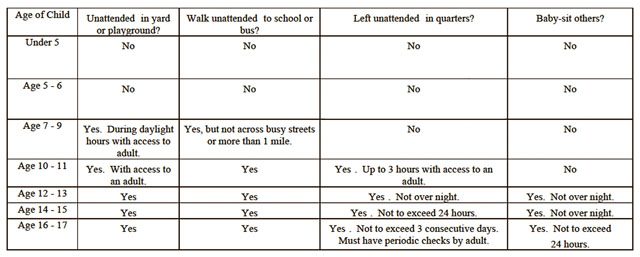Parents have responsibilities, and when it comes to children, they have to accept full responsibility for the decisions their young make as well as their own.
As they grow older, their parents may begin to allow them more freedom. However, some parents may not know about Ramstein’s own guidelines on when they are legally allowed to leave children alone and for how long.
The KMC is held to certain standards for the supervision of children, and parents’ failures to meet them may constitute child neglect, said Kristin Estrada, 86th Force Support Squadron youth center instructional director.
“Child safety should be every parent’s number one priority,” Estrada said. “I understand that parents may feel more comfortable with leaving their children alone for longer periods of time as they get older, but if an incident occurs, the parents are going to be asked questions. That’s why we have a policy matrix about this specific responsibility.”
According to the matrix, a child is considered to be “attended to” when in the presence of, or under the protection within sight or hearing of, an appropriate caregiver. Completion of Red Cross baby-sitting class and infant and child CPR is strongly recommended for every teen — minimum age of 12 — before caring for other children.
According to the child supervision matrix, children with a history of Attention Deficit Hyperactive Disorder, Attention Deficit Disorder, Developmental Delay, behavioral problems, impulsivity, psychiatric problems or other impairments shouldn’t be left alone.
Chief Master Sgt. Aaron Bennett, 86th Airlift Wing command chief, says decisions like leaving children unprepared for the responsibility of being unattended add up and can even impact the Airmen and mission around them.
“Children need to be safely supervised and well cared for and wherever they are, they should feel safe and secure,” Bennett said. “It’s important that families stay proactive and use common sense when it comes to such a responsibility. If anything were to happen to someone’s child, the community would feel the heartache.”
Parents must use good judgment and consider the physical, emotional and psychological maturity of their child when determining the level of supervision required.



